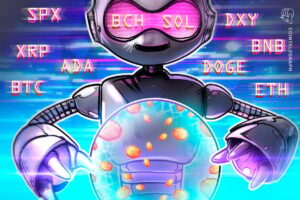
The price of ADA, the native cryptocurrency of the Cardano blockchain, surged to a daily high of $1.56 on Monday, its highest point since December 27, according to CoinGecko.
Since then, the token has slightly backtracked, changing hands at $1.54 by press time. It is, however, still up 8.2% over the day, and an impressive 30.4% in the last week.
With a market capitalization of just over $49 billion, Cardano is currently the industry’s fifth-most valuable network.
The price action follows a flurry of activity around the blockchain, including the launch of Pavia, the first-ever metaverse project in the Cardano ecosystem.
The metaverse seeks to merge virtual, augmented, and physical realities into a unified environment offering a broad range of features such as gaming, social experiences, non-fungible token (NFT) trading, and many more.
Pavia, as stated in the official announcement, comes hot on the heels of similar, fast-growing Ethereum-based projects like Decentraland and the Sandbox Game.
📺 We are delighted to present the ‘Pavia Experience’ video as detailed in our roadmap. Providing some ‘in-game’ elements and examples of the endless possibilities with the ‘metaverse’. Feedback will be collected in Q1 2022. #Cardano #Metaverse pic.twitter.com/D1HPeNcOt8
— Pavia.io (@Pavia_io) December 17, 2021
Some 100,000 plots of virtual land were issued on Pavia, each representing a unique NFT with individual coordinates. About 60% of these parcels were pre-sold throughout October and November 2021, with the remaining batch to go on sale in Q1 2022.
Currently, the most expensive plot on Pavia listed on the Cardano NFT marketplace CNFT is being sold for 100,000 ADA (about $150,000 in current prices).
Cardano doubles down on scalability
On Saturday, SundaeSwap, a Cardano-based decentralized exchange (DEX), announced that its mainnet launch is scheduled for January 20.
According to a blog post, projects will be allowed to create pools beginning Tuesday.
As the team behind SundaeSwap noted, this will be “a fully-functional beta” release.
“We are launching with a Beta label because, while the DEX’s smart contracts have been fully audited and the DEX will meet all industry standards for security, the implementation of fully decentralized governance will not be immediately possible due to existing transaction size limits on the Cardano blockchain,” SundaeSwap said.
📢The moment we’ve all been waiting for has finally come!
We’re excited and proud to share that SundaeSwap and the ISO will be launching on the evening of Thursday, January 20th (EST)! 🍨
Check out the article below! 👇https://t.co/8oDYU6i3k9 pic.twitter.com/upgNZx2xH2
— SundaeSwap Labs 🍨 (@SundaeSwap) January 15, 2022
The Cardano development team is planning a series of improvements to the underlying protocol to address these issues, mostly focused on performance optimization and scaling.
As detailed in a recent blog post by IOHK, the development company behind the project, Cardano is now entering the Basho stage of its evolution, where more resources will be invested in “steadily increasing capacity and throughput to deal with the growth in the DApp ecosystem.”
According to IOHK, this will allow Cardano to “onboard first hundreds of thousands, then millions of new users,” ranging “from DeFi degens to citizens of developing nations.”
On-chain improvements planned by Cardano include a block size increase, which was recently expanded to 72KB.
“The goal is for blocks to be propagated to at least 95% of peers within five seconds by reducing the ‘dead time’ between blocks,” IOHK said, adding that “further increases will be applied over time based on ongoing system monitoring and overall network health.”
The Basho phase will also see several off-chain improvements.
These include the roll-out of sidechains connecting Cardano with the Ethereum Virtual Machine (EVM) and offloading some of the network’s computation so that transactions can partially happen outside the blockchain, improving the network’s overall efficiency.













